American-born food writer Alexander Lobrano fell in love with Paris as a teenager, moved to the city in 1986, and thirty years later appears as smitten with the French capital as ever.
He currently lives with his partner, Bruno, in a rooftop apartment in the Nouvelle Athènes district of the 9th arrondissement and doesn’t seem likely to be returning to Connecticut, which is where he grew up, anytime soon.
Alec is the author of the useful, highly reliable, and very entertaining Hungry for Paris: The Ultimate Guide to the City’s 109 Best Restaurants, which is now in a well-deserved second edition. His award-winning journalism has appeared in the New York Times, the Wall Street Journal, the Guardian, Bon Appetit, Food & Wine, Travel & Leisure, Conde Nast Traveler, and more. His second book, Hungry for France: Adventures for the Cook & Food Lover, was published last year.
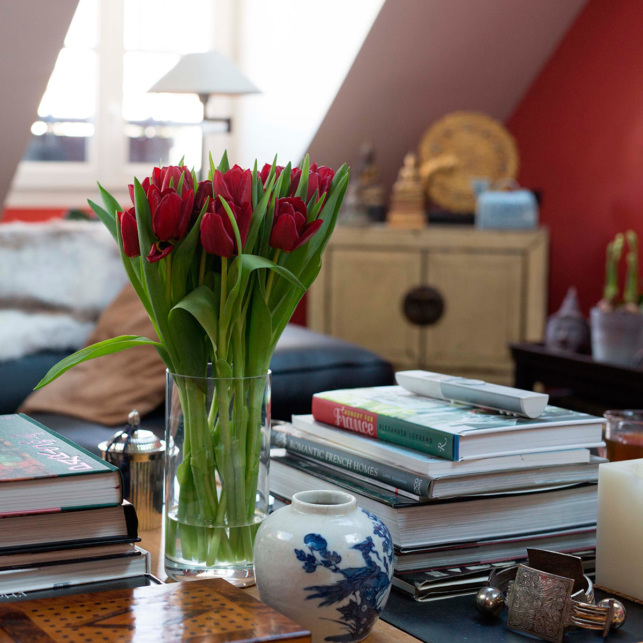
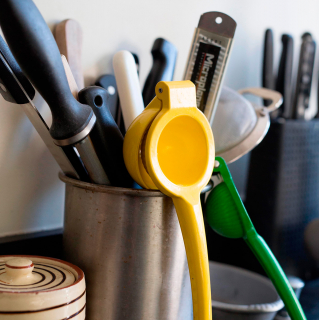
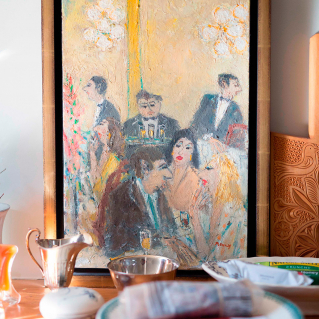
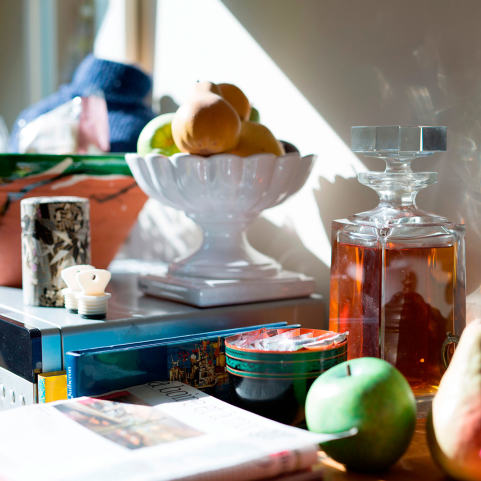
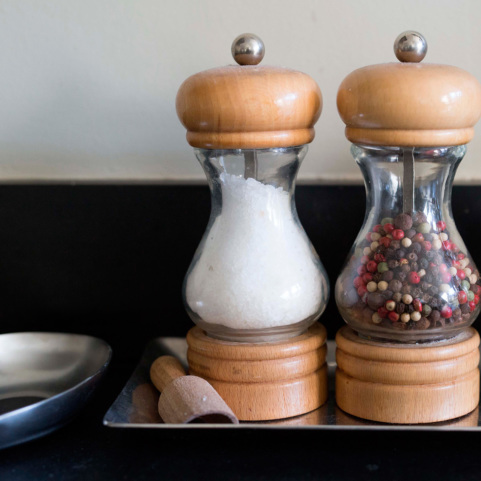
Why did you come to Paris?
I first visited Paris on a family trip to Europe when I was 15, and I was absolutely smitten by the elegance of the city, its food, the romance, the glamour. So as soon as I was offered a job here, I took it.
What do you love most about Paris now that it’s your home?
One of my great pleasures in Paris is walking in the city at night. I love walking, and I don’t need a map, I always know where I am. And the relentless beauty of Paris for daily life never abates. I can be in a vile mood knowing I have to go out on the street and get window cleaner at Monoprix for example and I always find something beautiful here – a doorway, a handle, something different.
You mentioned somewhere that you were attracted to French manners. What do you mean by that? A lot of people seem to think Parisians are rude.
There are different codes here and they’re constructed differently. The English-speaking world puts enormous importance on friendliness. In France you win friendship and daily life is codified in a way so that you’re always acknowledging one another, but, though there might be a pleasant exchange, there isn’t the pretense that you’re going to chat because as far as they’re concerned you don’t know each other, so why would you? It’s reserved, not rude. I actually find it comfortable.
To someone who has no idea what French cuisine is, how would you define it?
The real genius in French cuisine is making tough things tender, mostly meat and fish, and learning how to build flavor through sauces. A lot of the techniques here were perfected centuries ago; deglazing cooking juices with wine or vinegar or whatever, as the basis of a sauce, etc.
You’ve always said that Bœuf Bourguignon is one of your favourite French dishes. Is it still?
Oui, aujourd’hui et pour toujours ! It’s so much the essence of what delicious French food is, a great example of extracting flavor and building sauces and layering flavor.
A lot of people still think of French food as being heavy, unhealthy, drowning in sauce.
The past 40 years there has been a quiet, brilliant revolution in French kitchens to lighten the calorie content of the sauces by finding other ways to make them by using vegetable purées or herbal jus, keeping the flavor but losing the calories. That’s what Nouvelle Cuisine was all about.
So is French cuisine still the best in the world?
You eat well everywhere now, all over the world, that’s what’s changed. But France remains the ultimate gastronomic reference because of its history, its produce, the exigency of the French culinary education and the French general public having a huge body of knowledge that they bring to the table. People follow chefs here like we follow baseball players in America and this mad national passion for gastronomy is unique in the world.
Yet a lot of visitors say they find French food bland.
The French are keener to subtlety than we are. We like things to be big flavor bombs; the French still like things really, really subtle. The French are geniuses at nuance and the whole society is nuanced; the kitchen is nuanced, the fashion is nuanced, the perfume is nuanced. I love that subtlety, and I’ve learned to appreciate it.
Are Paris restaurants better or worse than when you arrived?
I think the food is better than when I got here. There are so many different choices now and there’s the passion for produce that didn’t exist in the late 1980s. That said, the category of restaurants that has gone underwater is the brasserie. I loved the brasseries when I first moved to Paris because they were so glamorous. They were never cheap and the food was never brilliant, but they were lively and fun, with French comfort food. Now the food is industrialized and there’s very little conviviality. The happy story is the old-fashioned bistros which were disappearing aren’t disappearing anymore. Not only are young chefs cooking excellent, contemporary bistro food, now a bunch of them have decided to start cooking traditional bistro food, so we’re spoiled for choice in Paris.
Have you got a favourite local bistro to recommend?
There’s a new place that’s open near me called Le Bon Georges, on the Rue Saint-Georges. It’s run by an utterly charming man named Benoît and it’s become a neighborhood institution in like 15 minutes. He’s a consummate host, bilingual, passionate about wine and good food, and the food is delicious.
These days, since the arrival of the internet and Trip Advisor and Yelp, etc, everyone’s a critic. What place is there left for a professional food critic like yourself?
The thing a professional critic is actually there to do is to transcend personal taste and be able to say, “I don’t particularly like whatever this dish might be, but I see that it was made with great art and beautiful produce.” Everyone has a right to their own opinion, but the way criticism is done on the internet is indignant, it’s not informed, and it’s completely subjective and sort of self entitled and I feel sorry for the chefs. When I write I’m really humble and think really carefully about what I’m going to say before I criticize someone who has been on their feet 16 hours a day. Whether you’re a butcher or a baker or a chocolate-maker or pastry chef, this is hard work! The education is really hard, the daily life is really hard, you’re putting in a massive amount of hours. So I’m always respectful towards the people and places I write about or review.
Will you always live in Paris?
My mother is always asking me if I will ever go back to live in the United States! And I don’t rule it out. But I have such feelings of tenderness and belonging here in Paris and there is always that flutter when I come back into the city from the airport and I see the Eiffel Tower on the horizon or the Sacré Cœur and I have the thought, “I’m home.”
New to Paris?
Here are Alec’s tips for making the most of your dining experience.
- Don’t come to Paris to eat a chicken breast. Come to Paris to eat something different. It’s part of the adventure.
- Always make a reservation! The French consider the reservation as a sign of respect, so you know that you’ll be well-received and they’ll be waiting for you.
- If you have special dietary needs, if you are vegetarian or gluten-free, tell the restaurant when you make a reservation. Don’t spring it on them when you get there.
- Most restaurants will have a staff member or two who speak English, but they are less likely to have an English menu. If in doubt, take a dictionary or a translation app.
- Don’t expect to rewrite the menu and ask for ingredients to be added or left out! Each dish has been very carefully planned and there’s a reason why each ingredient has been used in a particular way.
- Don’t be afraid to ask you waiter or sommelier for help choosing wine. Most people (even the French) know a lot less about wine than they let on.
- If you can’t make it after all, have the courtesy to cancel the reservation. English-speaking people already have a very bad reputation for standing people up, so don’t make it worse.
Alec’s Favourite Places
My favorite park is Jardin du Luxembourg. It’s the best lesson in Parisian life you can possibly get: you just sit on a park bench and watch people and the park is brilliantly designed because there’s the park for mothers with children, the park for the chess table, the pony rides, the quiet shady corners for people to sit along reading books.
I’m an avid museum-goer too. I like the Musée Carnavalet. That’s one place I always send people because it’s a great lesson in Paris and the history of Paris. Every once in a while I’ll just walk through the Louvre for five minutes, which is a luxury we have living here. But in general I do prefer the smaller ones like the Guimet or the Marmottan or the Orangerie.
I’m also an art movie guy. I don’t do action films, but the French love movies so there is always an amazing range of movies to choose from. The other thing I really love here is dance. I developed a passion for ballet when I was a student in London and the Paris Opéra Ballet is wonderful. I go as often as I can, but it’s not easy because you have to buy tickets so far in advance and I travel so much that I never know when I’m going to be around.
I probably go out three to four nights a week, which is a lot, so one of my other favourite things to do in Paris is stay at home and cook. We go to the market on Saturday morning and do a great big shop, and we have friends over or we cook for ourselves. I won’t go to restaurants on the weekends. They’re too busy and under too much pressure.
Alec’s Picks
Alexander Lobrano’s blog
Hungry for Paris & France – The Ultimate Guide to Great Eating in Paris, France and Beyond
Le Bon Georges
45 rue Saint-Georges, 75009
Tel: 01 48 78 40 30
Musée Carnavalet
16 rue des Francs Bourgeois, 75003
Tel: 01 44 59 58 58
Musée Guimet
6 Place d’Iéna, 75116
Tel: 01 56 52 53 00
Musée Marmottan Monet
2 rue Louis Boilly, 75016
Tel: 01 44 96 50 33
Musée de l’Orangerie
Jardin des Tuileries, 75001
Tel: 01 44 50 43 00